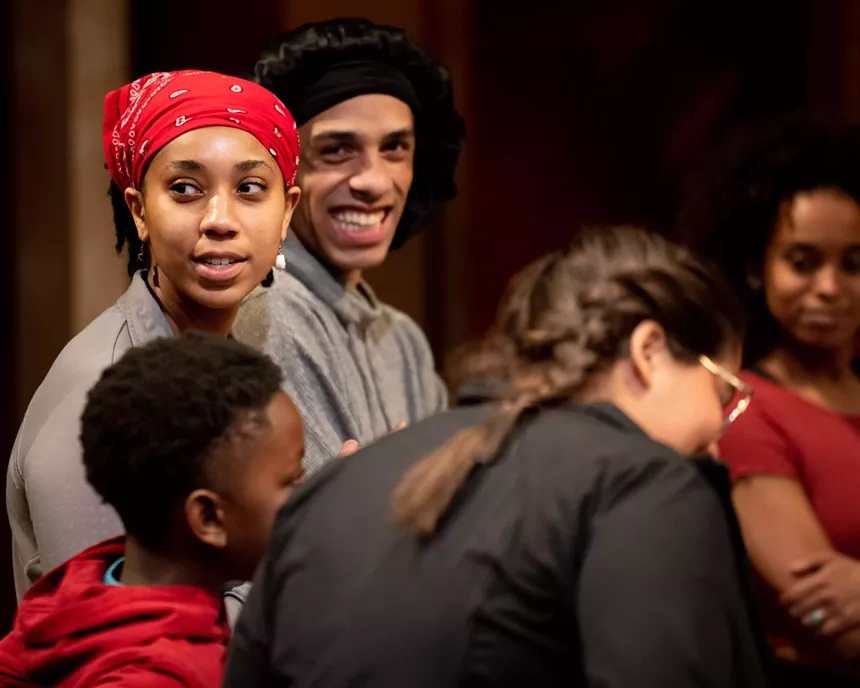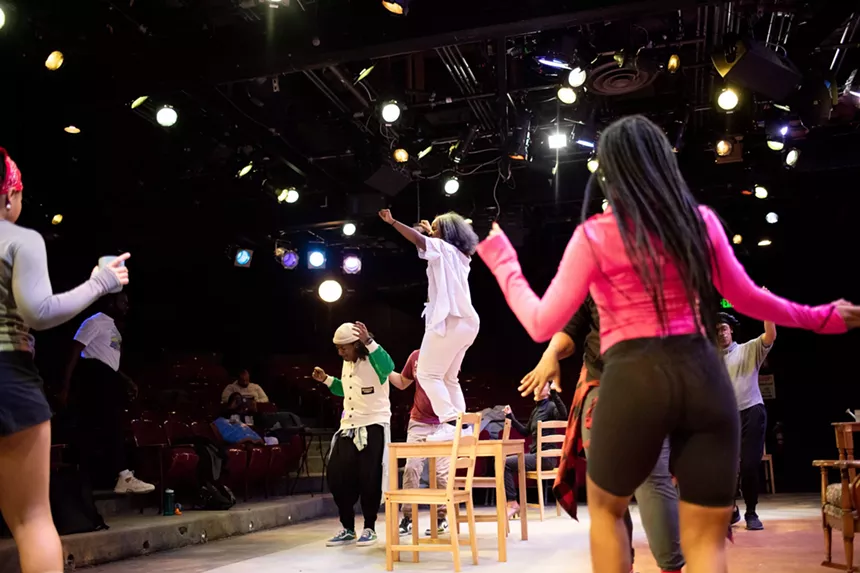After the death of the family patriarch, a significant life insurance payout becomes a point of contention, unveiling different hopes and desires within the family. While Walter envisions a future in business, his mother dreams of home ownership and a medical career for her daughter, setting the stage for a profound exploration of family, identity and hope.
At the heart of this production is Christopher Page-Sanders, who fills the roles of director and choreographer. Having been in the ensemble Raisin at the Black Rep in St. Louis in 2004, Page-Sanders has a deep personal connection to the musical.
"It feels great to be directing and choreographing the Colorado premiere of Raisin, which has been a part of my life for twenty years," Page-Sanders says. "I've done work with Town Hall Arts Center in the past, choreographing Ain't Misbehavin', Sister Act and Once on this Island, so for me, it's just a huge honor that they asked me to come direct and choreograph Raisin."

"We are presenting this in a way that I think really works for 2024," says director and choreographer Christopher Page-Sanders.
Courtesy of Colleen Lee Photography
"And then you need this whole ensemble of people who create the outside world of the Youngers," Page-Sanders adds. "They give you more context of what it's like to live in the day-by-day nature of Chicago at that time. The ensemble has these incredible emotional moments that either juxtapose what's happening with the Youngers or give you even more reason why they are trying to create a better life for themselves."
The director emphasizes his innovative approach to this production, aiming to present a version that resonates with the present-day audience while honoring the original spirit of Hansberry's work.
"We are presenting this in a way that I think really works for 2024," Page-Sanders says. "There are assumptions that Raisin in the Sun is a tragedy, and while it is a drama, it is ultimately an American story. It's a story about a family in grief who is given the opportunity to make a decision that will change their entire world. Each person in the family has a different opinion about what should be done; you really see a family get torn apart and come together on how to make that decision."
Page-Sanders also sheds light on the innovative staging and interpretation of the play for contemporary audiences. The choreography, deeply rooted in jazz and social dance, serves as a vibrant expression of the Southside Chicago setting.
"The first thing on page one of the script is 'Raisin, Act One. Prologue. Night. The block. Southside, Chicago. A jazz ballet,'" he says. "We're doing something a bit different, but the ballet lets you see the real life of what was happening in the outside world, based on what Chicago felt like for Black people. … It's rooted in these everyday moments that then get heightened and emotionalized."

At the heart of this production is Christopher Page-Sanders, who fills the roles of director and choreographer.
Courtesy of Colleen Lee Photography
While Page-Sanders wants "everybody to see the show," he worked with THAC to host Colorado's first-ever "Black Out" performance on April 6. Inspired by events on Broadway and the West End for performances of Slave Play, Black Out shows are specifically designed so Black audiences can have an inclusive space to engage deeply with the story's nuances.
"It gives the community the opportunity to take part in a theatrical experience that is specifically for them," Page-Sanders says. "Although we enjoy being able to perform for everybody, as a Black artist, there's nothing like having a room filled with Black people who understand the complexity of these characters. ... When you get to perform the art for your community, it's a different experience, and it's an experience that, even for the audience, allows them the emotional space to be in sanctuary with the artists."
The music, under the direction of Trent Hines, and performances by iconic Colorado artists like Mary Louise Lee as Lena "Mama" Younger are pivotal to the show's emotional depth. Lee brings a personal touch to her role, relating her own experiences as a mother who is around the same age as her character and reflecting on the historical context of the Black family's journey for a better life.
"History does repeat itself, so we know those situations in this Younger family are still going on," Lee says. "I had grandparents who were one of the first to buy a house in a predominantly white neighborhood. It's sad what happened, but it's an experience that everybody needs to know, especially since Black history is trying to be erased from schools. This is an opportunity to say, ‘No, this is what it was, what it is and who we are.’ That's why it's important for everyone to see Raisin — not just Black people, everyone."

Raisin invites audiences to engage with a story that, while set in the past, speaks profoundly to the present.
Courtesy of Colleen Lee Photography
Raisin invites audiences to engage with a story that, while set in the past, speaks profoundly to the present. It not only showcases the talents and voices of Colorado's Black artists, but also underscores the importance of theater as a space for all stories.
"Theater is a place for everyone, and Raisin is a story for everybody," Page-Sanders says. "It's a story of family, and although Lorraine was specific that the family was Black, everybody can relate to it. I am hoping that the Black and Brown community comes to Littleton to see this show in the same way that they would go to a show like The Lion King, TINA - The Tina Turner Musical or Ain’t Too Proud downtown. Also, not only for Town Hall, but do it for the Aurora Fox, Vintage and Cleo Parker Robinson Dance. We need the community to continue investing in and supporting the Black and Brown art that's happening in Denver."
Raisin runs Friday, March 22, through Sunday, April 14, Town Hall Arts Center, 2450 Main Street, Littleton. Get tickets at townhallartscenter.org.












